#i'm not a massive battle music fan generally but.... it was particularly Not To My Taste
Explore tagged Tumblr posts
Text
didn't love the music from the combat trailer ngl
#i'm not a massive battle music fan generally but.... it was particularly Not To My Taste#the official trailer music was good but. man. i wanted to mute the combat demo genuinely#datv
4 notes
·
View notes
Note
My fault, but what about the thread? Can you share thoughts? I don't know many k-pop fans personally so I want to know, be prepared for their joining. On here I only see gifs and fanfics.
A few things about me that are fair to know to judge my opinions. I'm a second gen fan, I began to listen to kpop in 2009, actually a fan in 2010. My first favorite band was DBSK/JYJ and was part of the whole “activism” to support JYJ in their way out of SM. Started in tumblr as an exo fan and my last fandom where I was active was loona in their golden days (2016-2018). To be honest I’m not active in fandom since 2018/19. I keep listening to kpop but I don’t keep up with new bands or whatever is going on in the kpop world. But it is actually pretty easy to assume this twitter user is talking about BTS and particularly RP.
I can’t answer everything she is saying because it has been some years since i don’t keep up with what is going on there. However, I can confirm that the army acts like BTS invented kpop lol. They love to speak about how they made kpop popular overseas when there was an actually large fandom base in europe, usa and latin america before they even debuted. Actually some bands like JYJ did quite successful concerts at that time in latin america. Even the expansion to Japan is something that Boa and DBSK did. Of course, BTS is a massive success, but they didn’t happen in the nothing, there was a whole process and context. I can confirm this thing about how they glorify their artist as the only true artist and the others idols are just fakers. But to be fair, that is something that vips (big bang fandom) did before. Well, the army is large so everything will be more annoying with them for a matter of numbers.
Army does act like they found the final gem, but it is not fair to say that only them are toxic with other artists because fanwars are old as kpop. I believe it is more a generational attitude or even an attitude with the past. I hear many young fans from different fandoms talking about a past where fanwars didn’t exist when such a thing never happened. We can recall fanwars from second gen groups with events like “black oceans” during festivals.
I do agree, in theoretical terms, that each phenomenon has their own features and with BTS there must be some specific issues. I’m just not that invested or updated to talk about this. However, in my opinion there are some inherent issues with the phenomenon of being a “fan” that can’t be avoided no matter the fandom. The idealization of the artist, the feeling of belonging and loyalty, are all problematic. We surely need to build ways to interact with artists less toxic. But for the music industry (no matter how annoying it may be for artists who have obsessed fans) they gain more money from people who are willing to give everything to their artist. This is also a problem of capitalism and consumer culture.
About twitter as a platform for fandom organization. Well in the old days 2011-2014, facebook and tumblr were also a big part of “spaces” for fandoms. Tumblr went down, facebook lost relevance yet fandom groups were still working until 2019 (when i last checked lol). Twitter has a specific feature for fans actions like TT, but fandoms won’t fall because the app falls, they are already important on tik tok and IG. With apps it’s a matter of adaptation, a big problem would be that twitter was still at its best but kpop fandom became irrelevant and can’t pull a TT. Why? because it is a battle to push your consumptions, make them relevant and gain space. Promotion helps to succeed and success sustains your cultural consumption. There will be more as long as they sell. Nevertheless, it is fair to say there are alot of “identity” issues in why kpop fandoms promote their artists.
What is actually in danger with twitter is the capacity of collective actions in social websites. Other websites have tags and trendings but can’t pull like twitter does. Regarding kpop fandoms, in my opinion twitter was a space of action but not the source of organization. Fandoms tend to agree with their actions in closed groups (like facebook at the time) and go to twitter with a tag and schedule that was already decided somewhere else.
In my opinion, being active in a fandom will consume too much of your personal time and will keep you frustrated because there is always some drama and fans are super annoying. However, you can still enjoy kpop from “outside”. IG is a good option, you find images and videos but don’t come across with the drama (not that much). Tumblr has very little these days but still can enjoy some gifs. I don’t have tik tok so I can’t talk about it. I’m not sure how is discord, but sound like the last place to be regarding fandoms (like forums)
*Yes, I am naming fandom by their names because I fear nothing.
9 notes
·
View notes
Note
Hey there loving your blog! If I'm not imposing too much, can you talk about tohobeth? Any version and anything at all!
I ALWAYS have time to talk Tohobeth. Since I feel like it would be unfair to talk about productions I haven’t personally seen, I’m going to keep my discussion mainly to the 2015-2016 production, since I have the DVD on it. My views on it aren’t as solid as they are on, say, 1789 or MA, mainly because, somewhat embarrassingly, I only got my DVD AFTER I left the States, with my mom scanning the files in and sending them on to me via GDrives. And, with my Master’s program....well. I’ve not been able to watch it anywhere near to where I usually do before forming hard opinions. (Generally speaking, it takes about....six months or so for me to REALLY settle into my opinions, though, as you can see re: Lady Bess, there are a few times where my opinions are still variable after years.)
It’s a fact well known at this point that I’m not the biggest Hanafusa Mari fan in the world, and it’s also a fact that she was recorded as Elisabeth twice, as opposed to Hana Ranno, who was double-cast in the role with her, getting a DVD of her own. Was I happy about this? No. Whenever I see Hana Ranno footage on Youtube, I feel this sort of ache in my chest because I REALLY would have loved to see her Toho Elisabeth. Maybe she wouldn’t have been a personal fave, maybe I would have actively hated her performance, but as it is, she’s acquired a semi-mythical significance to me now as The One That Fell Into Oblivion.

Such a pity she couldn’t show up on the DVD. Such a pity.
Part of why I’m so scathing, of course, is that I tend to REALLY like getting both casts so that I can see the differences between performers, and, with a musical called “Elisabeth” that obviously has Elisabeth as a protagonist...it can almost feel like getting half of what I normally get. It’s still good, I still do recommend the DVD, obviously, but also if I could go back in time to talk to some Toho execs and be like “Look, guys.....record both Sisis.”
Now, I come not to bury Hanafusa Mari, but to praise Tohobeth, so I won’t be too far on the attack here especially since, to be perfectly fair, I feel like Elisabeth is the single best Toho performance of hers I’ve seen (between Mozart, Lady Bess, Marie Antoinette, and Elisabeth). She’s been playing the role since 1996, so she has very much fine-tuned her interpretation at this point, and there are MANY people who feel like she’s the definitive Japanese Elisabeth. This is the role, more than any other single role, that made her a legend in the industry. I personally feel like she REALLY starts hitting her stride about midway through the first act and, by the start of the second act, she’s at her peak performance. The role of Elisabeth is very challenging for any actress; most Elisabeths are drawn to one of the three stages of Elisabeth’s life that we see - Some of them are very good at playing 15 year old Elisabeth, some the Young Wife/Empress, and some the older, bitter Elisabeth, and, personally, I feel like Hanafusa is best in the latter role. As an actress, she very clearly feels a draw to sadness and mourning (in both Lady Bess and Marie Antoinette, she took the sadder interpretation of both characters she played, as opposed to her costars, who separated between the low points and the high points of their lives) and Older Elisabeth gives her the chance to stay in her comfort zone. Unfortunately, when it comes to Younger Elisabeth, especially in the very beginning, I find that she can age revert herself a little TOO much, so that she plays Elisabeth-at-15 as Elisabeth-at-8, which makes her interactions with both Der Tod and Franz Josef a little bit on the uncomfortable side.
A personal highlight for Yoshio!Tod for me is his Die Schatten Länger in the first act, where he goes from sympathetic to seductive to sinister and then back to seductive. It’s an impressive performance of one of my favorite moments, if not my ULTIMATE favorite moment of the entire musical, and he does it so effortlessly. Watching him....he reminds me a little of Uwe Kröger? He isn’t quite as aloof and ageless as 1992!Der Tod, but looking at him in the role, I do get this vision of this otherworldly entity. He has this kind of floating, ethereal voice that we tend to associate with the classical Phantom of the Operas, with a very nice, smooth lower range in particular. I do also like his dynamic with Hanafusa Mari during “Wenn Ich Tanzen Will” -- She isn’t as reactive as some Elisabeths that I’ve seen, but I do still get the feeling of the two of them acting and reacting to one another, and this production is thankfully less....aggressive than certain productions. (2005, I’M LOOKING AT YOU.) I always prefer this scene as a verbal battle of wills, not necessarily Der Tod manhandling Elisabeth, and Toho delivers that.
His performance almost makes me forgive him for 2006 Marie Antoinette. Almost.
Shirota Yu on the other hand...he’s STILL otherworldly, but in a totally different way. He isn’t immature (I’ve SEEN immature Deaths, and he’s not), he isn’t the Bastard Boyfriend Der Tod, but there’s...something almost NAIVE about him at times? Not in a way that makes him less deadly, but in a way that makes him MORE so. He’s never interacted with a human before, not on this level, it’s very obvious he has no idea how humans really function or work, and Elisabeth confuses him just as much as she intrigues him. I also think that, at various times, you can REALLY see him having the time of his life in the role, playing a very, very expressive Tod in comparison to his more refined, aloof counterpart. Take their respective approaches to the death of little Sophie.

“Oh, Elisabeth! This is so ~sad~ Here, let me console you! (This should work, right?)”
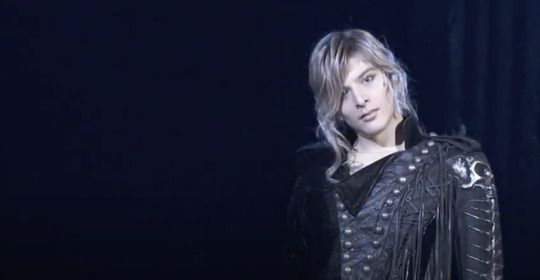
“Hm, interesting, it seems like she’s upset. This isn’t what I anticipated.”
And, at the beginning of Der Letze Tanz, which I’m including here purely because Shirotan is looking particularly memeable here.
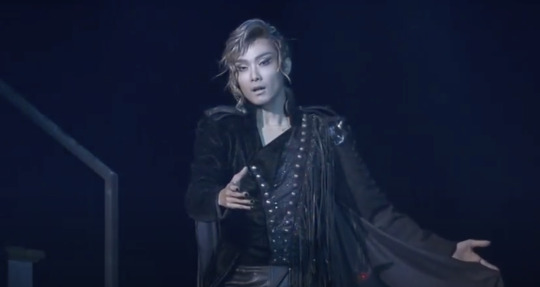
“Hello, it’s me, and yes, I’m majestic, I know, look at me.”
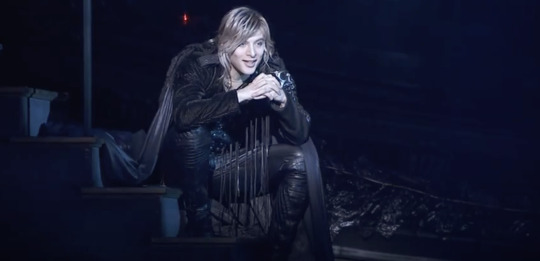
“You hate death, but live as a mortal. Curious! I am very intelligent.”
He’s a little rougher than Yoshio, a little less refined (I’ve heard Yoshio Inoue’s Der Tod compared, both positively and negatively, to a European aristocrat, which is actually a little ironic since, of the two of them, Yu Shirota Fernández is technically the more “European”, but. Well. In approach...) He has a wonderful voice (honestly, if you ever want to send your eardrums to heaven, listen to his cover of Die Schatten Werden Länger with Ramin Karimloo. Thank me later), though it’s different than Yoshio Inoue’s more classical voice. I think he has a little bit of a pop influence in there. Which might SEEM like the kiss of death for a performer, but in my opinion, he does work it. (Look, I can’t say anything negative about the guy: My mom has a massive crush on him, I own his album, and also I wasn’t able to finish the one video of him immediately following Miura Haruma’s death where he tried to sing through tears because it GOT me and now I can’t see Shirotan’s face without wanting to give him a massive hug. Which I can’t. Both for geographical reasons and also social distance.) It’s actually a little hard to compare the two Tods because, while they wear the same costumes, sing the same music, act against the same actress, they take such radically different approaches that it’s hard to say “Oh, yes, this one!” or “Oh, yes! That one!” Especially since I’m not sure that Shirota Yu’s voice would have worked with Yoshio Inoue’s approach or vice versa. I ended up loving both Der Tods for various reasons. I THINK that if my copies of Elisabeth were dangling off a cliff and my archnemesis told me to pick one, I would have to end up rescuing Yoshio Inoue’s version because I tend to prefer my sleek, elegant Tods (”Tode?”) but like. I’d be in mourning. Not the least because I’d have to tell my mom about the loss of Yu Shirota’s Tod.
Speaking of crushes...look. Takanori Sato’s Franz. We know that I have a minor, unfortunate crush on his Louis XVI in Marie Antoinette, and as Franz...He did SUCH a good job with a character who is hard to make sympathetic in the limited time he has. Most audiences are rooting either for Elisabeth/Death or Elisabeth/Independence, and Franz quickly loses sympathy as the musical goes on, so an actor who can make him likeable is working against the tide there, but Takanori gives him SUCH a huge degree of warmth that I found myself rooting for Elisabeth/Franz to make things work out even though we know that it can’t.
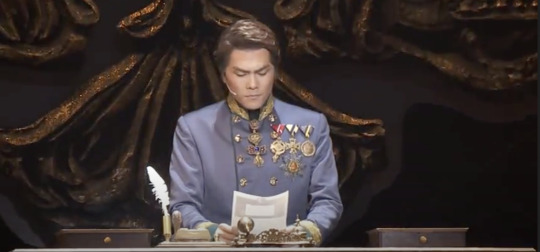
I repeat my assessment from my Marie Antoinette write-up: #FersenDerTodWho?
Mario Tashiro...we know that I do love this man’s work. In my opinion, he has one of the single best voices in the industry. But also, in my opinion....as an actor....he just.....doesn’t have it. He tends to act like the single most one-dimensional version of a role he can get away with. In the beginning, when Franz is young and in love with Sisi during “Nichts ist Schwer” there were a few moments where I felt like I might go into a sugar coma.

They’re so cute together. Kill me now.
And, unfortunately, Franz doesn’t have enough time to REALLY show off his range, with the exception of a few low notes and the act one finale (which to be fair, he is BRILLIANT in), to the point where I did, however slightly, end up preferring Takanori Sato both vocally and acting wise. I wouldn’t say that he’s wasted in the role, because he DOES do a good job with what he’s given, but I do think that it’s hard to appreciate just what he can do from this alone.
It’s only fitting, after talking about Franz, that his mother should come right after him always lurking in the background, as always. And, overall....there isn’t THAT much difference, namely because Sophie, as a role, just doesn’t have that much variance in the role. And most of the fanbase is kind of. Actively rooting for her to die at any given point. There’s not that much that a given actress can really do with it. It’s nothing against them, it’s just a matter of how the role is written. I do find it interesting how both approached the death scene: Tatsuki Kohju’s Sophie is crying at the end, frightened of the afterlife as she clutches, frantically at the death angels before she slumps over, her cane falling out of her hand. As powerful as she was in life, she’s terrified of what comes beyond, as powerless as any other mortal. Suzuke Mayo tries to say something, mouthing some words, but then jerks sharply at a pain in her chest, trying to stay conscious for as long as she can but staggering backwards anyway, falling into the arms of the death angels with a look of pure relief on her face. You get the feeling that she’s been fighting for Austria for so long, made so many personal sacrifices of her own, that the chance for rest is coming as a relief to her. I THINK I prefer the latter interpretation, but honestly, both of them are solid in their own right, though I’m not sure that the role REALLY gets enough to justify a double-casting. (Also....I have to say that, while I wouldn’t necessarily get a musical just for Susuke Mayo, I’ve seen her in enough to have suitably warm feelings for her performances, so I’m already coming in with some amount of bias.)
Lucheni...I don’t REALLY pay as much attention to, compared to, say, the main trio, but he is our narrator, and both Luchenis did take very different approaches to the character. Songha’s Lucheni was...well, if he isn’t in love with Der Tod himself, he’s obsessed with him. We see him reaching out to Der Tod both at the beginning (when he appears on stage for the first time) and at the end, when Der Tod drops the knife to him. There’s a fervor to him in those scenes in particular that I tend to associate with worshippers in a Baptist Revival. Yamazaki is a little bit more subdued, in the beginning I get the feeling that he’s almost under Der Tod’s trance himself, and, in general, I think he’s a little bit more cynical, though, by the ending, he’s dropped a lot of that pretense. He looks at the knife after he’s stabbed her (Songha’s Lucheni almost lets her walk into the knife, but Yamazaki’s STABS), before a smile comes to his face as he falls down while running, finally laughing. It’s like he’s been playing things more or less subdued this entire time and this is his real BREAK, now that he finally has the opportunity to kill. With Songha’s...
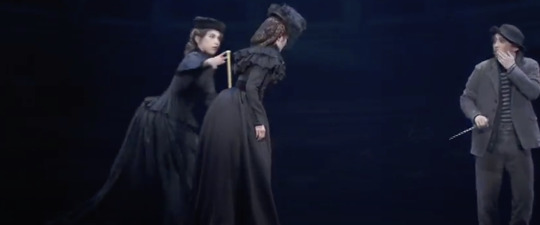
He’s actually shocked. I’m not generous enough to Lucheni, as a character, to say that he really feels bad about killing ELISABETH per se, but that...he’s borderline-fetishized Death for so long, waited so long, and then, when he finally has the chance...it doesn’t live up to his expectations. A woman walked into his knife. (She walked into his knife ten times.) There’s nothing dramatic or exciting about it. One small action, and it can’t be taken back, there’s no getting away from it. He actively stumbles around stage afterwards, confused as he tries to run away, like he doesn’t know what to do now.
Of the two of them, Songha has a rougher, kind of growelly voice, to the point where I didn’t REALLY like his Lucheni all that much until I started to analyze his acting. Voice is a MASSIVE factor in whether I enjoy a performance, simply because...it’s my eardrums. I very much want to keep them intact. (For what it’s worth, Songha is NEVER rough to the degree it hurts my eardrums, but there have been a few...) It’s arguably fitting for someone who, as a character, is as rough as Lucheni, but it wasn’t to my personal taste, while Yamazaki...I mean, he’s playing Der Tod in the 20th anniversary. Whenever we get the 20th anniversary. He’s played some of the most celebrated roles in Japanese theatre. The man has RANGE and a fantastic control of the role. (Also...look. As a bisexual woman, I’m just going to say it: He’s more personally attractive to me, though the Toho Lucheni isn’t....really....designed to be attractive. If you go in expecting Takarazuka Lucheni or Serkan Kaya’s extremely pretty Lucheni...well. He isn’t. Either version of him. He looks like someone just pulled him out of a garbage can.) I did notice that both of them have quite a bit of growl in their voice during “Milch”, though, so some of this could be directorial intervention. While BOTH of them absolutely nail the high note in the Prologue, in my opinion, Yamazaki’s riffs are an absolute HIGH point for me (...okay, yeah. Literally and figuratively. I didn’t mean to make a pun. But here we are.) I do think, at the end of the day, I prefer his voice, though I think that both of them did interesting things with the role, taking what is essentially opposite approaches. I don’t think I have a really clear favorite there. One of these days, I’ll have to check out Songha’s other work to see what his voice is like in its “Natural State” so to speak since if, for example, I’d only ever heard Oka Kojiro’s voice in 1789, I’d have just assumed he only knew how to bark out his roles.
One role that wasn’t double-cast but that I WOULD like to draw attention to anyway is Furukawa Yuta as Rudolf. My friend @chibimyumi‘s already written some wonderful meta on Furudolf that I highly recommend, and there’s very little that I can really add except to say that he’s probably my personal take on the role, mainly because, while he IS sympathetic, that isn’t the entirety of his character. He isn’t just a pawn in Der Tod’s game,though Der Tod is unquestionably manipulating him, but a character in his own right. I’ve noticed in the Elisabeth fandom...it can be quite common to go “POOR WOOBIE RUDOLF” and....yes, he did have a very tragic life, but there was more to his life than just the tragedy. He had a life and a personality outside of that (that and....the general erasure of the 17 year old girl who died by his side, but it’s hard to be too harsh on the fandom for that when the musical itself kind of skips over that.)
Now, on those notes, there’s one thing that...I don’t want to talk about, but I feel like it’s an elephant in the room if I don’t.
Namely, Hass.
I don’t like talking about this scene, mainly because it’s deeply uncomfortable subject matter, and it’s deeply controversial subject matter that, as a goyische white person, I really am out of my depth in talking about. There’s a reason why “Hass” was censored from the Zuka, and I know that some fans have gotten hooked on the Zuka, only to go to the German or the Toho, and have subsequently found themselves shocked and/or traumatized. I understand that it’s meant to be deeply uncomfortable, and the Toho DOES show Rudolf actively getting them to stop, which further solidifies the idea in Die Schatten Werden Länger of Rudolf WANTING to stop things from getting out of control, but he can’t. The Toho is also a little bit more brutal than I’m used to, showing an explicit attack on a Jewish man. It’s the kind of thing that, especially in the German and Austrian productions, was meant to give the audience a wake-up call and remind them of their own past, as a country, but can be traumatizing for any Jewish fans or fans of color who might be watching. Especially given that Lucheni, who we tend to associate as a jerk, yes, but as our more-or-less likeable narrator, is actively taking part. I know what they were going for, but also there’s a reason why I never stream this production without a warning ahead of time, and I also tend to end up skipping this scene.
The staging is very nice, probably one of the more intricate Toho stagings I’ve seen, with a lot of props and backgrounds moving around, often mid-song, as well as projections in scenes such as Die Ersten Vier Jahre in order to show the passage of time.
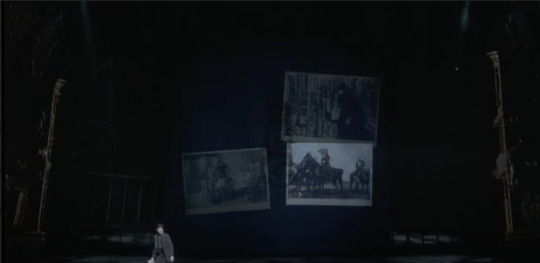

The costuming is, predictably for Toho, fantastic, lavish without being quite as sparkly as their Takarazuka counterparts, having quite a few nice velvet numbers in there. The costuming of Elisabeth is so iconic it seems pointless to discuss outfits like the Sternenkleid or the coronation outfit, but I think this production does well on even some of the non-iconic ensembles. See:

And...you know, I said no iconic numbers, because they tend to be all people talk about, but like. One Sternenkleid pic. Because it’s what she deserves.
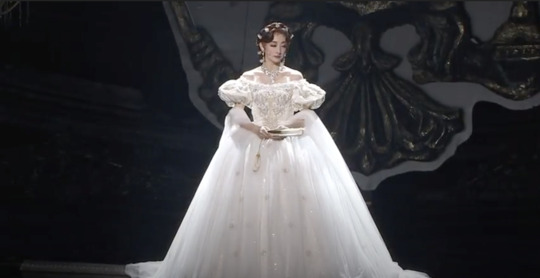
Is it Too Soon to say that I’d stab her for that wardrobe alone? Because damn. And that’s not even touching the jewellery.

I want.
Overall, I believe this is probably my favorite production of Elisabeth. Toho really knocked it out of the park, and it’s a good compromise between the Takarazuka and the original Austrian in many, many ways (I do love them, for example, keeping Der Tod’s presence in Alle Fragen Sing Gestellt from the Takarazuka) while also making a production that’s distinct and stands on its own two feet. I really would like to have another proshot of the 2019-2020 cast, whenever the Japanese theatre community is in a more stable place, because I really, really would like to see Manaki Reika, Yamazaki, and Furukawa Yuta’s takes on their new roles, because I feel like they could be really, really solid and I’ve heard fantastic things about at least Chapi and Furukawa Yuta (nothing against Yamazaki, just that I don’t know anything about his take on Der Tod.)
45 notes
·
View notes
Note
I just read both interviews, Part 1 and 2 of Jann Wenner's Rolling Stone Interview of 1971. It sounds as though John and the other Beatles DID have a realistic gripe about Paul taking over, directly projects, handing out musical assignments, etc., etc. and I'm sure he had the ego by this point to match! I would probably have become irritated by Paul as well. And no hints or even reading between the lines of John being emotionally hurt by Paul with regard to loss of intimate relationship.
Hello and thanks for writing in, Listener!First, I’d like to point out that we haven’t reached the Lennon Remembers portion of our Break-up Series, and will dig into it much more thoroughly in a future episode (stay tuned!).
Presumably this ask isn’t in response to anything we’ve actually discussed on the podcast, in which case I feel that I should explain that what we do on our show is reevaluate conventional wisdom and contextualize public statements within the realities of actual behaviors. In other words, not taking things like Lennon Remembers at face value is AKOM 101.
If what we were doing on this podcast was as easy as simply reading the most infamous interview John Lennon ever gave (the one upon which the conventional story of the Beatles break-up is founded), it wouldn’t be much of a podcast or a very groundbreaking analysis, would it?
Second, I’d like to mention that listeners/readers can hear the entire (3.5 hours!) interview on You Tube. Very evocative with audio! Wenner’s editing in the print versions often make John sound more coherent and less vitriolic towards everyone but Paul than the audio reveals (i.e. the shitty comments about Paul are always printed but the ones about George, Brian, etc often aren’t).
Next, we’d like to state the usual disclaimer (which everyone is probably already aware of but is a good reminder anyway!): John later disavowed this interview. In fact, he was so angry at Jann Wenner for publishing it as a book, it apparently created a permanent rift between the two. You may choose to view/value this interview as John being super honest, but please consider that in this allegedly “truthful” book/interview, John:
claims George is musically/creatively inferior to John
declares the McCartney album “rubbish”
reveals his belief that he and Paul’s confidence levels are intrinsically, inversely related to one another
says George was so aggressively rude to Yoko that John wished he would’ve punched him over it
proudly admits that he “maneuvered” the other Beatles to get Klein in as manager
bemoans the fact that everyone says Brian Epstein was so great “just because he’s dead” and that Brian cheated and robbed the Beatles
makes derisive comments about “fags” at least five times in the printed version alone and calls Lee Eastman “a wasp Jew, man, that’s the worst kind of person on earth.”
admits to lying in interviews and deflects accountability on the basis of being “just a guy” who mouths off about stuff
As for Paul, John is admittedly all over the place, swinging fairly wildly from nostalgic (reminiscing about having “a good mind like Paul’s” on his side and co-writing with their “fingers in each others’ pies”) to bitter (”Paul thought he was the Beatles,” etc).
As for the accusations that Paul was tyrannical, we’ve addressed these before (particularly in Break-Up Episode 2). Just as Geoff Emerick, Michael Lindsay Hogg and Doug Sulpy (and even John, when he was feeling more generous) have articulated, we too feel that Paul stepped up and led the band in a time of need and deserves unequivocal credit for that. We believe much of the subsequent complaining from the other Beatles is akin to the kind of griping one directs at a colleague who gets promoted (“who died and made you king!?”) and while some of it was likely based in genuine irritation at Paul’s communication style, much of it was probably petty. This is why we are looking at the situation from all angles, to get a better sense of what is reality v. spin. In any case, we don’t dispute that there were power struggles within the band.Any reader is free to choose John’s side in any/all of these battles. But our overall takeaway from this particular interview is that John was unloading a lot of pent-up rage; against teachers, fans, Aunt Mimi, his mum, critics, Paul and anyone else who didn’t properly recognize his genius and praise him for it.
“That’s what makes me what I am. It comes out, the people I meet have to say it themselves, because we get fuckin’ kicked. Nobody says it, so you scream it: look at me, a genius, for fuck’s sake! What do I have to do to prove to you son-of-a-bitches what I can do, and who I am? Don’t dare, don’t you dare fuckin’ dare criticize my work like that. You, who don’t know anything about it.”
Based solely on Lennon Remembers, one could reasonably believe John didn’t like anyone but Yoko and Allen Klein (of whom he also speaks with reverence). Fortunately, John gave a million other interviews in his lifetime, so even though this one is given a disproportionate amount of weight (probably b/c it is the most inflammatory and “raw”) we can compare John’s comments, behavior and art over a broad spectrum of time. We feel this gives us a better, more thorough and more authentic portrait of John’s POV. This is a good idea with ANY public figure, but especially important in John’s case, since, by his own admission he has a tendency to say what he feels in the moment and doesn’t necessarily stand by his own statements afterwards.
John in 1976: “I get a bit absolute in my statements. [laughs] Which sometimes get me into deep water, and sometimes into the shallow.”
To your other point, our overall impressions about John’s feelings regarding “loss of an intimate relationship” with Paul certainly do not hinge on Lennon Remembers, nor have we ever suggested they do. In fact, LR is commonly used as the primary proof-point by McCartney detractors and Lennon/McCartney deniers (those who willfully and sometimes passionately ignore and/or deny the deep love between John and Paul, as described by John and Paul themselves and everyone in their lives) that Paul was a tyrant who destroyed the Beatles with his massive ego.
We have never disputed the existence of Paul’s ego. But consider this: John refers to himself as an egomaniac REPEATEDLY throughout this interview. Why is there a loud faction of people who consider John being an avowed egomaniac perfectly reasonable (sexy even!), but find it unforgivable that Paul is the same way? Consider these excerpts from Lennon Remembers:
Do you think you will record together again?
I record with Yoko, but I’m not going to record with another egomaniac. There is only room for one on an album nowadays.
How would you assess George’s talents?
[…] Maybe it was hard for him sometimes, because Paul and I are such egomaniacs, but that’s the game.
Who do you think is good today? In any arts…
The unfortunate thing about egomaniacs is that they don’t take much attention of other people’s work. I only assess people on whether they are a danger to me or my work or not.
[Tangential]
But the Beatles were artists, and all artists have fucking’ big egos, whether they like to admit it or not […]
Yes, John rants repeatedly about Paul’s ego during this interview- while he simultaneously declares his own genius and artistic superiority over others. We find it mind-boggling how this irony continues to evade some people, but there it is.
George Harrison has repeatedly complained about BOTH John & Paul’s egos (and their shared ego IRT “Lennon/McCartney”), but again, this is often ignored in favor of singling out Paul as the villain.
Furthermore, it’s helpful to bear in mind when consuming Lennon Remembers that John and Yoko had received training in media-messaging by this point and were very savvy at Public Relations. We know from people close to them that they drafted their stories in advance before offering them to the public. This fact, combined with Lennon’s tendency to “mouth off” means we have the right and responsibility to question and examine John’s claims rather than simply parrot them mindlessly.
If you are genuinely interested in our take, we recommend our Break-Up Series. We think you will find it well-researched and thoughtful, even if you disagree with some of our conclusions.
Or if you simply dislike McCartney and find him “irritating,” that’s fine too. Not everyone has to like everyone!
For additional discussion/analysis of Lennon Remembers, I recommend any of several threads on Erin Torkelson Weber’s site, the Historian and the Beatles.
the flawed lens of Lennon v. McCartney
Jann Wenner’s bio
how Rolling Stone shaped the breakup
discussing a podcast appearance
Thank you so much for this ask! It is always a pleasure to share information. Have a wonderful day.-The AKOM crew
110 notes
·
View notes